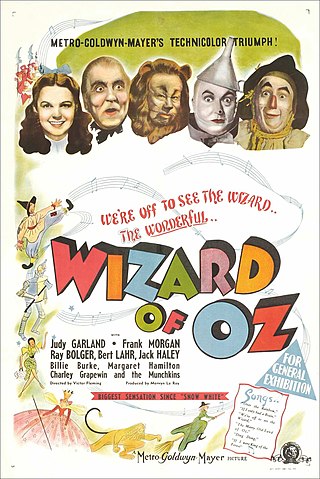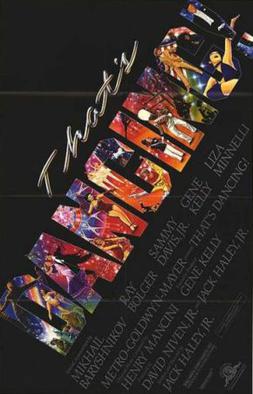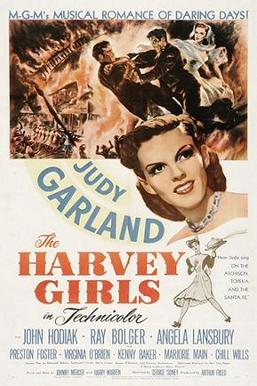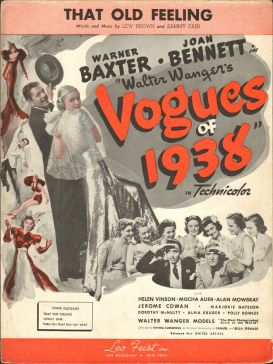
Love Me or Leave Me is a 1955 American romantic musical drama film starring Doris Day, with James Cagney and Cameron Mitchell in support. Also a biopic, the MGM production recounts the life of Ruth Etting, a singer who rose from dancer to movie star. Nominated for six Academy Awards, the picture was directed by Charles Vidor, and written by Daniel Fuchs and Isobel Lennart.

Harold Arlen was an American composer of popular music, who composed over 500 songs, a number of which have become known worldwide. In addition to composing the songs for the 1939 film The Wizard of Oz, including "Over the Rainbow", which won him the Oscar for Best Original Song, he was nominated as composer for 8 other Oscar awards. Arlen is a highly regarded contributor to the Great American Songbook. "Over the Rainbow" was voted the 20th century's No. 1 song by the RIAA and the NEA.

The Wizard of Oz is a 1939 American musical fantasy film produced by Metro-Goldwyn-Mayer (MGM). An adaptation of L. Frank Baum's 1900 children's fantasy novel The Wonderful Wizard of Oz, it was primarily directed by Victor Fleming, who left production to take over the troubled Gone with the Wind. It stars Judy Garland, Frank Morgan, Ray Bolger, Bert Lahr, Jack Haley, Billie Burke and Margaret Hamilton. Noel Langley, Florence Ryerson and Edgar Allan Woolf received credit for the screenplay, while others made uncredited contributions. The music was composed by Harold Arlen and adapted by Herbert Stothart, with lyrics by Edgar "Yip" Harburg.

Arthur Schwartz was an American composer and film producer, widely noted for his songwriting collaborations with Howard Dietz.

That's Dancing! is a 1985 American compilation film produced by Metro-Goldwyn-Mayer that looked back at the history of dancing in film. Unlike the That's Entertainment! series, this film not only focuses specifically on MGM films, but also included films from other studios.

The Harvey Girls is a 1946 Technicolor American musical film produced by Arthur Freed for Metro-Goldwyn-Mayer. It is based on the 1942 novel of the same name by Samuel Hopkins Adams, about Fred Harvey's Harvey House waitresses. Directed by George Sidney, the film stars Judy Garland and features John Hodiak, Ray Bolger, and Angela Lansbury, as well as Preston Foster, Virginia O'Brien, Kenny Baker, Marjorie Main and Chill Wills. Future star Cyd Charisse appears in her first speaking role on film.

Thunder Bay is a 1953 American adventure film distributed by Universal International, produced by Aaron Rosenberg, directed by Anthony Mann, and starring James Stewart, Joanne Dru, Gilbert Roland, and Dan Duryea. It was shot in Technicolor and was released on May 20, 1953. This film tells the story of two engineers drilling for oil in the Louisiana gulf while dealing with hostility of the local shrimp fishermen fearing for their livelihood, and features the first non-western collaboration between Stewart and Mann.
"Anything You Can Do (I Can Do Better)" is a show tune composed by Irving Berlin for the 1946 Broadway musical Annie Get Your Gun. The song is a duet, with one male singer and one female singer attempting to outdo each other in increasingly complex tasks.
"April in Paris" is a popular song composed by Vernon Duke with lyrics by Yip Harburg in 1932 for the Broadway musical Walk a Little Faster. The original 1933 hit was performed by Freddy Martin, and the 1952 remake was by the Sauter-Finegan Orchestra, whose version made the Cashbox Top 50. Composer Alec Wilder writes, "There are no two ways about it: this is a perfect theater song. If that sounds too reverent, then I'll reduce the praise to 'perfectly wonderful,' or else say that if it's not perfect, show me why it isn't."
"Dearie" is a popular song. The music was written by David Mann, and the lyrics, by Bob Hilliard. The song was published in 1950.

"That Old Feeling" is a popular song about nostalgia written by Sammy Fain, with lyrics by Lew Brown. It was published in 1937.

On Moonlight Bay is a 1951 American musical film starring Doris Day and Gordon MacRae, and directed by Roy Del Ruth, which tells the story of the Winfield family at the turn of the 20th century. The movie is based loosely on the Penrod stories by Booth Tarkington. The sequel By the Light of the Silvery Moon was made in 1953.

Is Paris Burning? is a 1966 epic black-and-white war film about the liberation of Paris in August 1944 by the French Resistance and the Free French Forces during World War II. A French-American co-production, it was directed by French filmmaker René Clément, with a screenplay by Gore Vidal, Francis Ford Coppola, Jean Aurenche, Pierre Bost and Claude Brulé, adapted from the 1965 book of the same title by Larry Collins and Dominique Lapierre. The film stars an international ensemble cast that includes French, American and German stars.
"I Said My Pajamas (and Put On My Pray'rs)" is a popular song with music by George Wyle and lyrics by Edward Pola. It was published in 1949. The song describes somebody who is in love, but whose descriptions about what she does are full of switcheroos, indicating her absentmindedness.
April in Paris may refer to:
"I'm an Indian Too" is a song from the 1946 musical Annie Get Your Gun, by Irving Berlin. It was originally performed by Ethel Merman. It is sung by the main character Annie after Sitting Bull adopts her into the Sioux tribe.

Alexander's Ragtime Band is a 1938 American musical film released by 20th Century Fox that takes its name from the 1911 Irving Berlin song "Alexander's Ragtime Band" to tell a story of a society boy who scandalizes his family by pursuing a career in ragtime instead of "serious" music. The film generally traces the history of jazz music from the popularization of Ragtime in the early years of the 20th century to the acceptance of swing as an art form in the late 1930s using music composed by Berlin. The story spans more than two decades from the 1911 release of its name-sake song to some point in time after the 1933 release of "Heat Wave", presumably 1938.

Claude Dauphin was a French actor. He appeared in more than 130 films between 1930 and 1978, including Barbarella, The Quiet American, and a voice role in The Tale of the Fox, considered to be one of the earliest stop-motion animated films.

Portrait Edition is a three disc box set compilation album released by Sony Entertainment and featuring songs recorded by American singer Jo Stafford. The album was released by Sony on August 30, 1994.

Jean-Claude Dauphin is a French actor who is primarily known for national movie productions in France. He is a uncle to American actors Griffin Newman and James Newman as well as too chef Romilly Newman.















